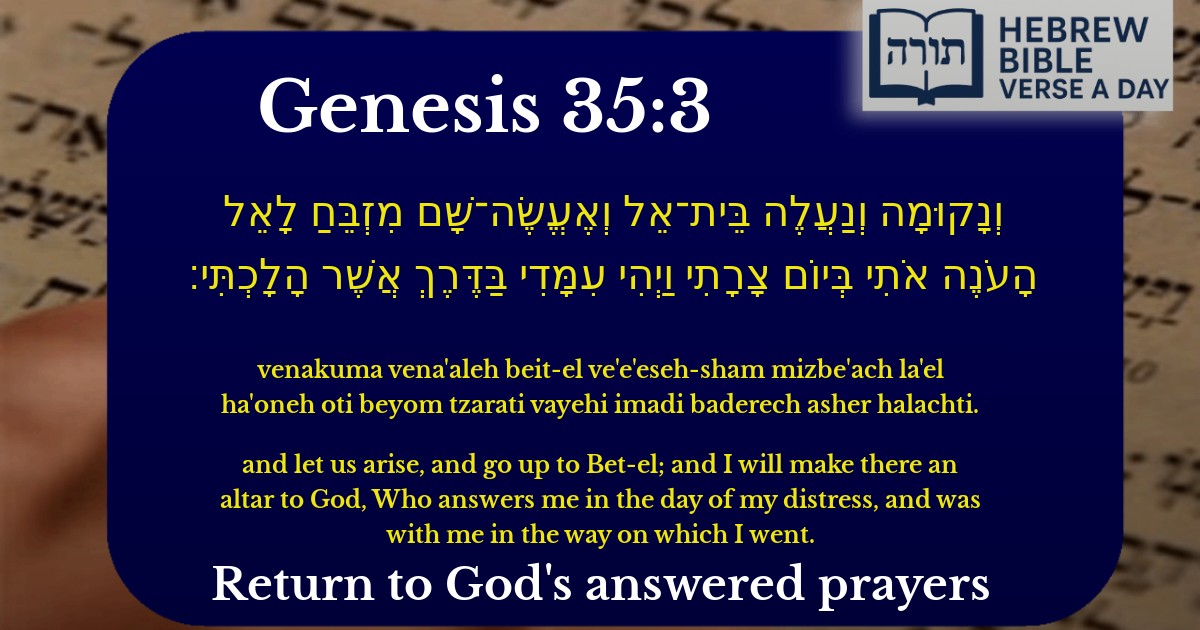Join Our Newsletter To Be Informed When New Videos Are Posted
Join the thousands of fellow Studends who rely on our videos to learn how to read the bible in Hebrew for free!
Hebrew Text
וְנָקוּמָה וְנַעֲלֶה בֵּית־אֵל וְאֶעֱשֶׂה־שָּׁם מִזְבֵּחַ לָאֵל הָעֹנֶה אֹתִי בְּיוֹם צָרָתִי וַיְהִי עִמָּדִי בַּדֶּרֶךְ אֲשֶׁר הָלָכְתִּי׃
English Translation
and let us arise, and go up to Bet-el; and I will make there an altar to God, Who answers me in the day of my distress, and was with me in the way on which I went.
Transliteration
Venakuma vena'aleh beit-el ve'e'eseh-sham mizbe'ach la'el ha'oneh oti beyom tzarati vayehi imadi baderech asher halachti.
Hebrew Leining Text
וְנָק֥וּמָה וְנַעֲלֶ֖ה בֵּֽית־אֵ֑ל וְאֶֽעֱשֶׂה־שָּׁ֣ם מִזְבֵּ֗חַ לָאֵ֞ל הָעֹנֶ֤ה אֹתִי֙ בְּי֣וֹם צָֽרָתִ֔י וַֽיְהִי֙ עִמָּדִ֔י בַּדֶּ֖רֶךְ אֲשֶׁ֥ר הָלָֽכְתִּי׃
וְנָק֥וּמָה וְנַעֲלֶ֖ה בֵּֽית־אֵ֑ל וְאֶֽעֱשֶׂה־שָּׁ֣ם מִזְבֵּ֗חַ לָאֵ֞ל הָעֹנֶ֤ה אֹתִי֙ בְּי֣וֹם צָֽרָתִ֔י וַֽיְהִי֙ עִמָּדִ֔י בַּדֶּ֖רֶךְ אֲשֶׁ֥ר הָלָֽכְתִּי׃
🎵 Listen to leining
Parasha Commentary
📚 Talmud Citations
This verse is not quoted in the Talmud.


Context of the Verse
This verse (Genesis 35:3) is part of Yaakov Avinu's instruction to his household as he prepares to return to Beit El, where he had previously experienced a divine revelation (Genesis 28:10-22). After the troubling incident with Dinah in Shechem (Genesis 34), Yaakov seeks to spiritually elevate his family by returning to the place where he first encountered Hashem's presence.
Yaakov's Call to Spiritual Renewal
The phrase "וְנָקוּמָה וְנַעֲלֶה בֵּית־אֵל" ("let us arise and go up to Beit El") reflects Yaakov's desire for both physical and spiritual ascent. Rashi explains that the term "וְנָקוּמָה" implies urgency in repentance and spiritual awakening, while "וְנַעֲלֶה" suggests elevation in holiness. Beit El, meaning "House of God," represents a place of divine connection, and Yaakov seeks to return his family to this sacred space after their trials in Shechem.
The Altar and Divine Providence
Yaakov declares his intention to build an altar to "הָאֵל הָעֹנֶה אֹתִי בְּיוֹם צָרָתִי" ("the God Who answers me in the day of my distress"). The Midrash (Bereishit Rabbah 81:2) notes that this refers to Hashem's protection during Yaakov's difficult encounters with Lavan and Esav. The altar serves as both gratitude for past salvation and a plea for future divine assistance.
Hashem's Constant Presence
The concluding phrase "וַיְהִי עִמָּדִי בַּדֶּרֶךְ אֲשֶׁר הָלָכְתִּי" ("and was with me in the way on which I went") emphasizes divine providence throughout Yaakov's journey. Ramban explains that this acknowledges Hashem's unwavering protection, even when Yaakov was unaware of it (as in his flight from Esav). The Sforno adds that this recognition motivates Yaakov to lead his family in renewed dedication to Hashem.
Practical Lessons from the Verse